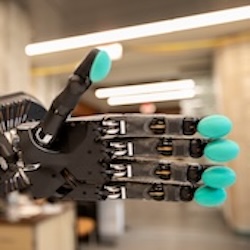Events
Past Event
Dexterity for Humanoids, Webinar Panel
Center for Robotics and Biosystems (CRB)
12:00 PM
Details

Humanoids make up one of the fastest growing subfields of robotics, and dexterity is perhaps the greatest challenge in making humanoids practically useful. In this webinar panel, researchers from the U.S. National Science Foundation HAND Engineering Research Center will discuss dexterity with thought leaders from three prominent humanoid companies: Sanctuary AI, Boston Dynamics, and Apptronik.
Host: Kevin Lynch, Northwestern University
Moderator: Brenna Argall, Northwestern University and Shirley Ryan AbilityLab
Panelists:
Jeremy Fishel, Sanctuary AI
Alberto Rodriguez, Boston Dynamics
Luis Sentis, Apptronik and University of Texas, Austin
HAND is the U.S. National Science Foundation Engineering Research Center on Human Augmentation via Dexterity
Time
Thursday, May 8, 2025 at 12:00 PM - 1:00 PM
Contact
Calendar
Center for Robotics and Biosystems (CRB)
ME512 Seminar Series- Anthony Rollett
McCormick - Mechanical Engineering (ME)
3:00 PM
//
LR3, Technological Institute
Details
Abstract:
We provide an overview of a recent NASA University Leadership Initiative project entitled “Development of an Ecosystem for Qualification of Additive Manufacturing Processes and Materials in Aviation”. This work demonstrated the dependence of fatigue on defect structures in AM Ti-6Al-4V. Our current NASA Science & Technology Research Institute “Institute for Model-Based Qualification & Certification of Additive Manufacturing (IMQCAM)” is creating a numerical digital twin (DT) for predicting fatigue as a function of process parameters. The key result of a systematic variation across power-velocity space was that the defect number density was anti-correlated with fatigue life. The fatigue-based process window was much narrower compared to typical reports and explainable in terms of observed variations based on spatter rates and intermittent lack of melt pool overlap. We report on recent developments in modeling microstructure, texture and pores along with variations in heat treatment. We conclude that establishing a qualified materials process is feasible via an efficient survey of a limited domain of process space. Linking models together in the DT requires substantial effort in terms of data exchange. In terms of predictability of fatigue, the limited data suggests that the scatter in life is smallest in the long crack (Paris Law) regime, intermediate for short cracks and largest for crack nucleation. This provides an important background for Uncertainty Quantification (UQ), which is a major focus for the IMQCAM team and which has already revealed a significant sensitivity to compositional variations, for example.
Support from multiple agencies is gratefully acknowledged, including NASA, DOE/BES, DOE/NNSA, ONR, NSF, OEA, Commonwealth of Pennsylvania, and Ametek. I am indebted to my many collaborators.
Bio:
I have been a member of the faculty at Carnegie Mellon University since 1995. I am also the Co-Director of the NextManufacturing Center on additive manufacturing. Previously, I worked for the University of California at the Los Alamos National Laboratory. I spent nine years in management with four years as a Group Leader (and then Deputy Division Director) at Los Alamos, followed by five years as Department Head at CMU (up to 2000). I have been a Fellow of ASM since 1996, Fellow of the Institute of Physics (UK) since 2004 and Fellow of TMS since 2011. I received the Cyril Stanley Smith Award from TMS in 2014, was elected as Member of Honor by the French Metallurgical Society in 2015 and then became the US Steel Professor of Metallurgical Engineering and Materials Science in 2017. I received Cyril Stanley Smith Award from the International Conference on Recrystallization and Grain Growth in 2019 and the Hans Bunge Award from the Intl. Conf. on Textures of Materials (ICOTOM) in 2024. I was an International Francqui Professor (Belgium) in 2022 and I received the ASM Gold Medal and was promoted to University Professor, both in 2024. My research focuses on processing-microstructure-properties relationships with interests in additive manufacturing, the measurement and prediction of microstructural evolution, the relationship between microstructure and properties, especially three-dimensional effects, texture & anisotropy and the use of synchrotron x-rays.
Time
Monday, February 2, 2026 at 3:00 PM - 4:00 PM
Location
LR3, Technological Institute Map
Contact
Calendar
McCormick - Mechanical Engineering (ME)
